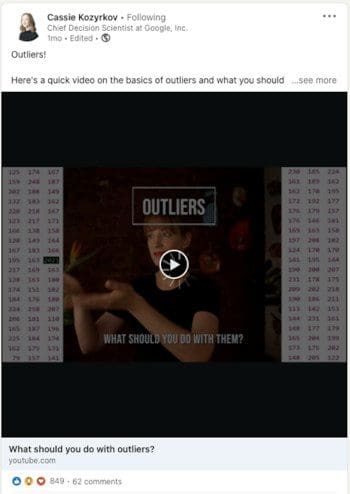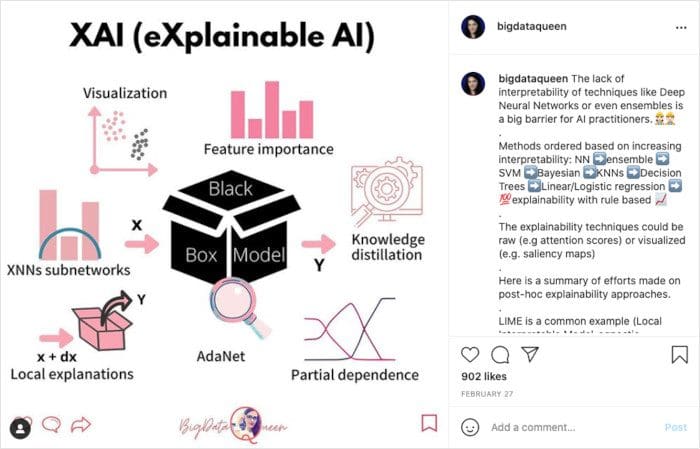Learning Data Science Through Social Media
Want your social media algorithms to show you actual algorithms? Spare a moment during your social media scrolling to learn a bit of data science. Here are suggestions for at-a-glance access to good ideas and tips on your favorite platforms.
By Susan Sivek, Data Science Journalist for Alteryx.

My social media feeds largely consist of news headlines, puppies, baked goods, and friends’ vacation photos. However, I’ve got a little data science sprinkled in, just the right amount to jolt my brain awake occasionally as I mindlessly scroll.
If you want to keep your social media time focused on fun, I respect that — but if you want those social algorithms to show you actual algorithms, keep reading. I’ll share some accounts and communities to follow for easy, at-a-glance access to good ideas and tips you can implement.
On Twitter, I follow a lot of data science news sources, but I also appreciate accounts that often share straightforward morsels of information in just 280 characters, without linking to longer resources.
- Data Science Fact (@DataSciFact) posts quick facts about a wide variety of data science concepts.
- Daily Python Tip (@python_tip) offers a neatly summarized idea or tool suggestion each day.
- One R Tip a Day (@RLang Tip) is run by the R community team at Microsoft and provides, as you’d guess, a daily R tip.
- Probability Fact (@ProbFact) offers a probability concept or insight every day.
In addition to learning from what people in your network share, there are other ways to glean useful data science info from LinkedIn.
- Follow hashtags. You can get a wider variety of information on topics of interest by following specific hashtags on LinkedIn (similar to how you can follow a hashtag on Instagram). For example, #datascience is used on many articles, videos, and other posts. LinkedIn will insert some of these hashtagged items into your main feed.

- Join groups. There are many data science-related groups on LinkedIn that share resources, offer networking, and host conversations. Check out Data Literacy Advocates, Women in Data Science, and Big Data and Analytics, or find more specific groups for your interests, like Supply Chain Data Science.
Each data-related subreddit has its own focus and ambiance. Here are a few to check out, but there are many more to explore.
- r/datascience: This is a lively community with over half a million members. There’s a weekly thread for discussions about learning data science and entering the field. It’s fairly strict about content and actively moderated.
- r/MachineLearning: This subreddit is huge (1.9 million members) and can be more technical, with many posts focused on sharing and discussing cutting-edge academic publications.

- r/learnmachinelearning: This group is more accessible for those just starting out with machine learning, though discussions can still dive pretty deep. It’s a bit more welcoming toward beginner-level questions than the two subreddits above.
- r/statistics: This community is a space for “all things dealing with statistical theory, software, and application.” You can safely explore even the most obscure corners of statistics here.
Yes, among the influencers and #sponsored posts, there’s some educational data science content!
- @bigdataqueen offers a fresh take on data science and ML that will pop in your feed, with well-designed graphics and thorough, informative captions.

- @pycoders posts cheat sheets and quick tips, plus a healthy quantity of memes so you can take a break from the serious stuff (and find fun things to share with coworkers).

- @data_science_learn shares some informative posts on stats topics and various tools for data science — and, again, ample memes.

- Women Who Code has specialized Instagram accounts related to data science and Python, among other topics. The Python account observes “Trivia Tuesday” each week to help you review Python fundamentals, and the data science account offers video snippets and stats review posts.

Original. Reposted with permission.
Bio: Susan Currie Sivek, Ph.D., is the senior data science journalist for the Alteryx Community, where she explores data science concepts with a global audience. She is also the host of the Data Science Mixer podcast. Her background in academia and social science informs her approach to investigating data and communicating complex ideas — with a dash of creativity from her training in journalism.
Related:




